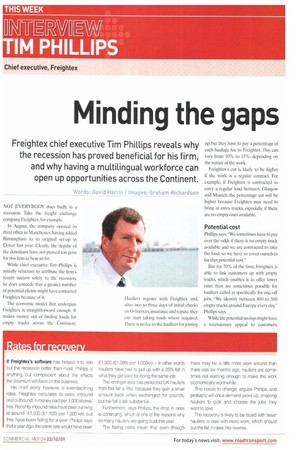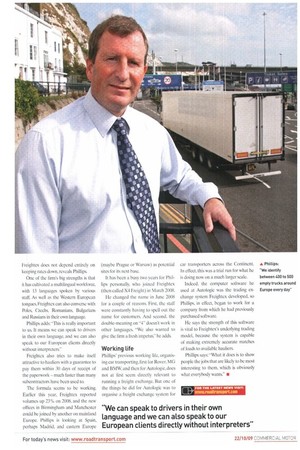Minding the gaps
Page 18

Page 19

If you've noticed an error in this article please click here to report it so we can fix it.
Freightex chief executive Tim Phillips reveals why the recession has proved beneficial for his firm, and why having a multilingual. workforce can open up opportunities across the Continent.
Words: David Harris / images: Graham Richardson
NOT EVERYBODY does badly in a recession. Take the freight exchange company Freightex, for example.
In August, the company opened its third office in Manchester, having added Birmingham to its original set-up in Dover last year. Clearly, the depths of the downturn have not proved too grim for this firm to bear so far.
While chief executive Tim Phillips is initially reluctant to attribute the firm's recent success solely to the recession. he does concede that a greater number of potential clients might have contacted Freightex because of it.
The economic model that underpins Freightex is straightforward enough. It makes money out of finding loads for empty trucks across the Continent. Hauliers register with Freightex and, after two to three days of initial checks on 0-licences, insurance and repute, they can start taking loads where required. There is no fee to the hauliers for joining up, but they have to pay a percentage of each haulage fee to Freightex. This can vary from 10% to 15%, depending on the nature of the work.
Freightex's cut is likely to be higher if the work is a regular contract. For example, if Freightex is contracted to carry a regular load between. Glasgow and Munich, the percentage cut will be higher because Freightex may need to bring in extra trucks, especially if there are no empty ones available.
Potential. cost
Phillips says: -We sometimes have to pay over the odds if there is no empty truck available and we are contracted to take the load, so we have to cover ourselves for that potential cost."
But for 70% of the time, Freightex is able to link customers up with empty trucks, which enables it to offer lower rates than are sometimes possible for hauliers called in specifically for one-off jobs. "We identify between 400 to 500 empty trucks around Europe every day," Phillips says While the potential savings might have a recessionary appeal to customers, Freightex does not depend entirely on keeping rates down, reveals Phillips.
One of the firm's big strengths is that it has cultivated a multilingual workforce, with 13 languages spoken by various staff. As well as the Western European tongues, Freightex can also converse with Poles, C2echs, Romanians, Bulgarians and Russians in their own language.
Phillips adds: "This is really important to us. It means we can speak to drivers in their own language, and we can also speak to our European clients directly without interpreters."
Freightex also tries to make itself attractive to hauliers with a guarantee to pay them within 30 days of receipt of the paperwork — much faster than many subcontractors have been used to.
The formula seems to be working. Earlier this year, Freightex reported volumes up 23% on 2008. and the new offices in Birmingham and Manchester could be joined by another on mainland Europe. Phillips is looking at Spain, perhaps Madrid, and eastern Europe (maybe Prague or Warsaw) as potential sites for its next base.
It has been a busy two years for Phillips personally. who joined Freightex (then called X4 Freight) in March 2008.
He changed the name in June 2008 for a couple of reasons. First, the staff were constantly having to spell out the name for customers. And second, the double-meaning on "4" doesn't work in other languages. "We also wanted to give the firm a fresh impetus," he adds.
Working Life Phillips' previous working life, organising car transporting, first for Rover. MG and BMW and then for Autologic, does not at first seem directly relevant to running a freight exchange. But one of the things he did for Autologic was to organise a freight exchange system for car transporters across the Continent. In effect, this was a trial run for what he is doing now on a much larger scale.
Indeed, the computer software he used at Autologic was the trading exchange system Freightex developed, so Phillips, in effect, began to work for a company from which he had previously purchased software.
He says the strength of this software is vital to Freightex's underlying trading model, because the system is capable of making extremely accurate matches of loads to available hauliers.
Phillips says: "What it does is to show people the jobs that are likely lobe most interesting to them, which is obviously what everybody wants."
FD" FOR THE LATEST HEWS VISIT: www.roadtransport.com
















































































































































